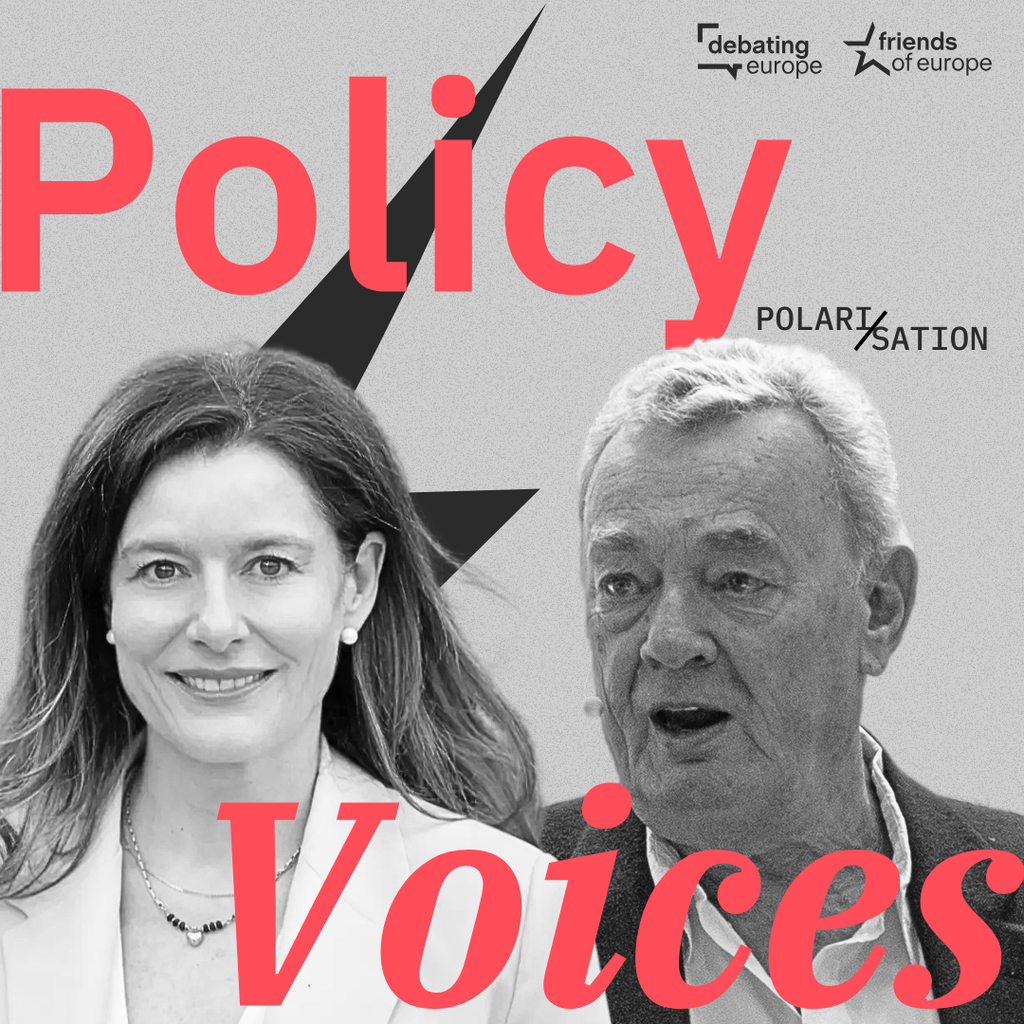Polarisation, disinformation, trust: do young French people think like…
Past event In person

- Area of Expertise
- Democracy
Peace, Security & Defence

Senior Fellow for Peace, Security and Defence at Friends of Europe, and former Deputy Assistant Secretary General for Emerging Security Challenges at the North Atlantic Treaty Organization (NATO)
For many of us in the Western think tank community, observing and analysing the health of liberal democracy has become something of an occupational hazard. Leaning over the sick patient, we endlessly fret about which organs of the anatomy are in the most robust shape and which infirm ones stand the best chance of recovery. We look for any indication that terminal decline has already set in, or which type of surgical intervention might still keep the patient alive – at least for a little longer. And if the patient could indeed make a full recovery, what change of diet, exercise regime and lifestyle would we need to put in place to ensure that he preserves his newfound health thereafter?
Indeed there are three reasons why liberal democracy has seemed in recent years to need increasing amounts of intensive care from those of us who still believe passionately in Winston Churchill’s mantra that “democracy is the worst form of government, except for all others”.
First, there is the erosion of democratic norms and standards in the established democracies as step–by–step human and civil rights are curtailed, governments bypass parliaments, the media are bullied and “the will of the people” (i.e. “those who support and vote for me”) is invoked to justify the disregarding of alternative or minority views and interests.
Second, more democracies are turning definitively into autocracies rather than soldering on as a messy combination of both. Here governments and strongmen leaders enjoying several terms in power have had long enough to gerrymander electoral districts to their advantage, muzzle the independent and opposition media by putting it out of business, denounce their critics as foreign agents and traitors, and install faithful ‘yes men’ in all branches of government, public administration and the economy. Elections may still take place but an increasingly unlevel playing field means that there can be only one result: continuity always, change never. Ultimately, as in Viktor Orban’s Hungary, authoritarian leaders stop pretending that they are applying democratic standards, albeit according to their own conception of what these mean, and come clean about their contempt for liberal institutions and values.
Third, established autocracies are radicalising and turning into totalitarian states reminiscent of the 1930s. Opponents are not merely denounced but poisoned, imprisoned or forced into exile. The state becomes more aggressively nationalistic and resorts more readily to the use of force to crush foreign rivals that, it is alleged, threaten its own compatriots with ‘genocide’. Parliaments are reduced to rubber stamping cheerleaders, and populations are subjected to mind–numbing propaganda and forced to live perpetually in an Orwellian alternative reality where lies are truth, truth is lies and 2 + 2 = 5. Clearly, the way in which Putin has exploited great Russian chauvinism to launch an unprovoked war against Ukraine and then used that conflict as a pretext for a further crackdown at home is but the latest exemplar of a playbook familiar to any student of 20th century world history.
All of the massive gains in expanding liberalism and human freedom across Europe, the former Soviet Union, Latin America, Asia and Africa in the three decades since the demise of global communism have now been reverse
The concurrency of these three scenarios for creeping authoritarianism has intensified the mood of doom and gloom when it comes to the survival of liberal democracy in an age of populism. Yet, like the famous quip about Wagner’s music, is it as bad as it sounds? Yes, unfortunately, is the conclusion of the most recent report on the rise of authoritarianism, which is published every spring by the Varieties of Democracy (V–Dem) Institute at the University of Gothenburg in Sweden. This year V–Dem has proclaimed that liberal democracy is back to where it was in 1989 on the eve of the fall of the Berlin Wall and the end of the Cold War. In other words, all of the massive gains in expanding liberalism and human freedom across Europe, the former Soviet Union, Latin America, Asia and Africa in the three decades since the demise of global communism have now been reversed, as if the costly struggle of the West to prevail in the Cold War was all for nothing.
V–Dem backs up its conclusion with some sobering facts: 70% of the world’s population now lives in non-democratic states; in 2021, 33 countries veered towards authoritarianism while only 5 moved towards democracy, or at least more tolerance of democratic practices and strengthening of democratic institutions. In 80% of existing authoritarian states, authoritarian practices and forms of control were reinforced in 2021. Even in that paragon of liberal democracy and the rule of law, the European Union, V-Dem calculates that 6 out of 27 EU member states have deviated significantly from EU democratic norms. Hungary and Poland are well–publicised examples, but V–Dem also now adds countries like Slovenia and Croatia to the list. More surprisingly, Austria and Portugal have a red flag as well. Apart from the notorious case of Russia, other countries to the EU’s east have also gone backwards, notably Belarus, but also Armenia and Azerbaijan. V-Dem correlates growing authoritarianism with greater risk of armed conflict, calculating that this has increased by a whopping 300% over the past year. It is not only Russia and China that are cited here, but also a more nationalist India potentially becoming embroiled in a war with Pakistan or even China in the Himalayas. Overall, V–Dem finds that only 36 countries in the world, around one–sixth of the total, are genuinely healthy democracies.
Perhaps the one ray of light in this gloomy picture concerns the COVID–19 pandemic. At one stage there were fears that democratic governments might have exploited lockdown–related states of emergency, massive data collection on their citizens on health grounds, closed borders and restrictions on movement, demonstrations and public gatherings to build more authoritarian,‘Big Brother’ forms of mass surveillance and social control. After all, we know from wartime that states of emergency and Defence of the Realm and Patriot Acts are easily imposed but difficult to remove once the crisis is over. Even democratic governments do not easily give back powers once they have acquired them. Yet, in the democracies at least, a COVID-19 dip does not seem to have happened as restrictions are lifted and life slowly returns to normal. In the authoritarian states, by contrast, those systems of mass surveillance and social monitoring were in place well before the coronavirus outbreak.
So the immediate question that comes to mind is whether V-Dem is being a little too alarmist. After all, giving average statistics for the global population may hide a more differentiated picture. If India, a country with 1.4bn people, goes authoritarian, it obviously skews the average global statistic downwards much more than a military coup in the Seychelles, an island state with 96,000 people. Backsliding in large, populous countries like Brazil or the United States will shift the cursor more than the same in Slovenia or Croatia. Moreover, how many swallows do you need before you have a summer? Despite the erosion of democratic standards, central and eastern Europe are much more free and open than during the long decades under communism and Soviet domination. South Africa shows many worrying signs, particularly when it comes to corruption, cronyism, political violence and lack of political pluralism; but for the vast majority it is much more free and fair than under the Apartheid regime. Back in 1989, many countries across sub-Saharan Africa, North Africa, the Middle East and Asia were led by military dictators or one–party autocrats establishing family dynasties. Nearly all of them are gone now, even if the replacements have often proved disappointing and hopes for true democratisation, as in Algeria, Tunisia or Egypt, short-lived.
What makes democracy, despite several free elections, so fragile and so easy to dismantle?
There also does not seem to be a single causal reason for this slide towards authoritarianism in the way that the ideology of fascism and aggressive nationalism spread across the globe in the 1930s or the expansion of communism was pushed by Stalin’s Soviet Union and Mao’s China at the beginning of the Cold War. Russia and China today are drawing closer together and certainly defend a reactionary and illiberal vision of world order. Yet they are not promoting world revolution or sending their forces outside their borders to uphold loyal communist regimes in the way that their Marxist predecessors once did. Putin has his admirers in terms of reactionaries and wannabes in many countries, but he does not drive whole social movements and political parties in the way that Lenin and Stalin strove to do in their heyday. Consequently, more context-driven and local factors need to be considered to elucidate individual cases. Why, for instance, did a peaceful democratic revolution in Tunisia after 2011, which showed such promise in the hands of the moderate Islamist party, Ennahda, suddenly veer towards the one–man dictatorship of Kais Saied that has progressively neutered parliament, the judiciary, the independent media and now the constitution? What makes democracy, despite several free elections, so fragile and so easy to dismantle?
This is manifestly the key question rather than debating whether global democracy is back at the 1989 level. We are dealing with a number of trends that are driving democratic decay in the Western world and fuelling the attractiveness of the authoritarian alternative.
The first is what the RAND Corporation calls “truth decay”. Democracy dies through lies. Usually, propaganda and alternative realities are the hallmarks of closed societies where alternative and corrective sources of information are lacking or suppressed. That explains why 80% of Russians, according to some domestic polls, support Putin’s invasion of Ukraine. They watch state TV and only ever see one side of the story. Yet systemic lying is now creeping into established democracies as politicians realise that they can distort or deny the facts with no fear of public censure. The New York Times and The Washington Post kept a monthly tally of all the lies told by former president Donald Trump. They regularly ran into the hundreds; but there is no evidence that they lost Trump any of his core support. Boris Johnson in the United Kingdom is the first serving prime minister to be convicted of a criminal offence and he has been found to have misled the House of Commons. Yet he steadfastly refuses to resign, arguing that the war in Ukraine requires him to stay in power, as if UK policy towards Ukraine would be any different under his successor.
Politicians who claim that they are a different type of leader believe that this allows them to adopt different types of behaviour and sidestep the same rules as ordinary citizens. In this context, lies are essential to sustain political movements that are built on empty promises and fantasy visions of a return to the past. The old dictum of poor journalism – “never let the facts get in the way of a good story” – is creeping into our political life. The emergence of social media and the ability of anyone and everyone to join the global conversation means that information has become separated from evidence and facts. The profusion of deliberate lying makes voters doubt that the truth exists or can ever be found. Therefore, every political platform or programme is as good (or as bad) as any other. People engage in politics consequently because they believe wrongly that everything is possible, or they retreat into apathy and disengagement because they believe, equally wrongly, that nothing is possible. The problem here is that democratic politics takes place in the middle. It is about making trade-offs and difficult choices between competing priorities. It is about putting the general interest before the partisan and the long term and future generations before the immediate. By ignoring these realities or wishing them away, political lies infantilise voters and appeal for unconditional support rather than critical and constructive engagement.
By preventing democracy from functioning, disinformation thus moves to the next level: presenting democracy as inherently dysfunctional
The corollary of lies is disinformation and propaganda. Lies of course come into this but disinformation is broader in that it tries to bend reality and the presentation and interpretation of facts into the corset of a fixed political ideology or belief system. Thus a right–wing TV station like Fox News in the US will only select those facts or pieces of information that suit or shape its narrative. Viewers and voters are comforted in their view of the world by seeing it presented night after night on a major news channel. People disappear into self-sustaining information bubbles, in which keeping the community of believers together takes precedence over challenging the received wisdom or facing up to Al Gore’s “inconvenient truths”. Disinformation therefore reverses the sequence of intellectual enquiry whereby we gather the facts and evidence first, and then on this basis construct our hypothesis or interpretation. Instead, we go looking for any factoid or snippet of information that can substantiate our pre-existing worldview. The celebrated British economist, John Maynard Keynes, once said: “When the facts change, I change my mind. What do you do?” To which the modern populist voter would reply: “Ignore them and carry on.” In this way,disinformation prevents societies from moving forward by locking politics up into nostalgia for an imaginary past and irrelevant debates on secondary issues like national identity or pride. By preventing democracy from functioning, disinformation thus moves to the next level: presenting democracy as inherently dysfunctional.
The third element is polarisation. Autocrats thrive by dividing society into two enemy camps: us against them. The other camp is caricatured, presented as an existential threat to the values and norms of its rival and to be defeated by all means fair or foul. The extent of the threat to the lifestyle and interests of one camp justifies radical, anti-constitutional and occasionally illegal measures to protect it, up to and including the use of political violence. Hence the way in which Republican US Congressional leaders, together with their rank and file, have consistently played down the gravity of the 6 January 2021 attack on the US Congress by portraying the riots as a legitimate expression of public anger at a ‘stolen election’, rather than the attempt at sedition and insurrection against the US government that they truly were.
Polarisation prevents a dialogue between the two camps. Politicians, such as the Republican Congresswoman Liz Cheney, who dare to work with the other side on issues of principle, are denounced as traitors and forced into an electoral contest against an orthodox challenger to preserve their seats. In the world of polarisation, patriotism is to the party or group, not to the country. Governing and decision–making can take place only on the basis of strict majority voting along partisan lines, as coalition building is virtually impossible. Since each camp uses its time in office to reverse or cancel everything that its predecessor has done, again societies become blocked and lose their capacity to address truly massive challenges such as climate change, inequality, educational standards and skills, technology regulation, supply chain autonomy, and public health and obesity. Polarisation also takes out of political life another core feature of democracy: the role of arbiters, those elder statesmen and women who have the national interest at heart and can work across partisan lines to call time on leaders, rank and file, politicians and officials who break the rules or breach public trust.
Finally, we have the demise of the traditional political party. In the first round of the French presidential elections, the two parties that dominated French politics after the Second World War and supplied nearly all the presidents of France under the 4th and 5th Republics, namely the Socialist Party and the post-Gaullist centre–right, received together less than 7% of the vote. Both candidates lost their deposits. If the results of Marine Le Pen, Eric Zemmour and one lesser–known nationalist candidate are added together, the extreme right obtained 34% of the vote, 7% more than the centrist incumbent president, Emmanuel Macron. The far–left under Jean-Luc Melenchon obtained nearly 22% while the traditional Socialists, represented by the Mayor of Paris, Anne Hidalgo, were under 2%. The collapse of traditional political parties is not good news for democracy as they are being replaced by ‘national rallies’, which are little more than plebiscites for a single charismatic leader. These movements are wholly built around the personality of the leader, like United Russia under Putin. They come alive at election times and then fade again into the background. Can anyone name the No 2 in Le Pen’s National Rally, Melenchon’sLa France Insoumise, or even Macron’s La Republique en Marche? Unlike traditional parties where leadership is collective and leaders are replaced relatively smoothly at periodic intervals, the rallies are totally dependent on the single leader figure and unthinkable without them.
We need a debate on how and why democracies turn into authoritarian states
Traditional parties matter because they are broad churches with different groups and open debates. They embrace a broad spectrum of policies and are forced to confront the trade–offs and links between them. The UK Conservative Party – with its pro-EU and anti-EU, pro-market and state control, libertarian and family values wings – is a good example. Traditional parties promote talent but also censure and remove members who prove corrupt or incompetent. They are obliged not just to refresh their leaders but also their ideas in line with social change and public aspirations. So, they produce manifestoes and detailed plans, they embrace ideas from the outside and evolve, in contrast to the rallies that are tied to just one or two basic themes, such as reducing immigration, leaving the EU, or putting more police on the streets. As traditional parties decline, more votes gravitate towards the extremes. Tactical voting against someone or something becomes more important than positive voting for a political project.
Of course, an argument can be made that there are some positive elements here. More parties mean more choice and a better chance for the electorate to be able to vote for a party representing their personal priorities, such as the environment, free access to music and movies, or independence for Scotland. Multiple party coalitions and greater use of proportional representation in voting encourage the emergence of new small parties that can find a niche in the political landscape. Coalitions where parties control each other and there is no clear winner may make for a more considered and moderate government. Moreover, if traditional parties are in trouble, an argument can be made that they have only themselves to blame due to previous failures in government or for not responding fast enough to the changing concerns of the electorate. Populist parties, once in power and confronted with the realities of governing, do not keep their promises or perform particularly well either.In time, the pendulum may swing back to the traditional parties, as has been the case in Italy with the drop in support for Five Star and la Lega after their meteoric ascent.
Traditional parties are also holding up better in some countries than in others. For instance, in Germany, the socialists in the SPD bounced back and emerged victorious in last year’s elections despite years of meltdown in the opinion polls. The FDP and the Greens were able to get themselves back into power while the far–right challenge ebbed. The CDU/CSU now has the chance to rebuild and renew itself in opposition. In the UK, the Labour Party and the LibDems under new leaders are also rebuilding and re-emerging after some torrid years and collapse in support in traditional heartlands.
This mixed picture tells us that liberal democracy is by no means dead and the victory of authoritarian populists is by no means inevitable. Yet we also see from Putin’s Russia and the experience of Hungary, where Viktor Orban has just been re-elected for the fourth time, Poland and Serbia that once these authoritarians seize power and gain control of the media and the judiciary, they are difficult to dislodge even if elections remain relatively free and fair. So we need a debate on how and why democracies turn into authoritarian states.
So it is an issue of translating political engagement into practical politics according to democratic norms and principles
At which tipping point can we say that a country is a democracy no longer? When does a difference in degree become a difference in kind? When does a talking point turn into a turning point? As we grade democracies on their adherence to democratic norms and standards, how can we ensure that we are grading them fairly – being, like the best professors, neither too tough, nor too lenient? Above all, as we look at the overall quality of democracy in the EU, which lessons do we need to draw from the ability of some countries to preserve a vibrant parliamentary democracy, while in others, politics moves from the system to opposition to the system and protests in the streets?
What is clear is that there is no going back to the past. Society cannot be adjusted to democracy. Rather, democracy has to evolve with society. People are still mobilised by politics and visions of the future as we have seen in the massive demonstrations in favour of climate change action,in opposition to Brexit in the UK, as well as in response to COVID-19 restrictions or Putin’s war against Ukraine. So it is an issue of translating political engagement into practical politics according to democratic norms and principles. Direct democracy via social media has to be better linked to representational democracy via elected politicians and accountable leaders. If we are to get this right, we – the citizens – cannot take a back seat and leave it to the EU institutions or our national governments. Like all matters of life and death, it will demand the engagement of all of us.
My favourite cartoon in the Imperial War Museum in London is by the celebrated Daily Mail cartoonist, Philip Zec. It dates from May 1945 and shows a battle–weary Tommy with his kitbag getting off a troopship in Southampton to return at long last to wife, family and civilian life. “Don’t lose it again”, he shouts to the local dignitaries who are there to greet him as he disembarks. No more wars, please, because you allowed our precious democracy to decay and wither.
Past event In person

Past event In person - Prato, Italy

Past event In person

Next event In person & Livestreamed





Stay informed
We use cookies and similar technologies to adjust your preferences, analyze traffic and measure the effectiveness of our campaigns. Learn more about our privacy policy.